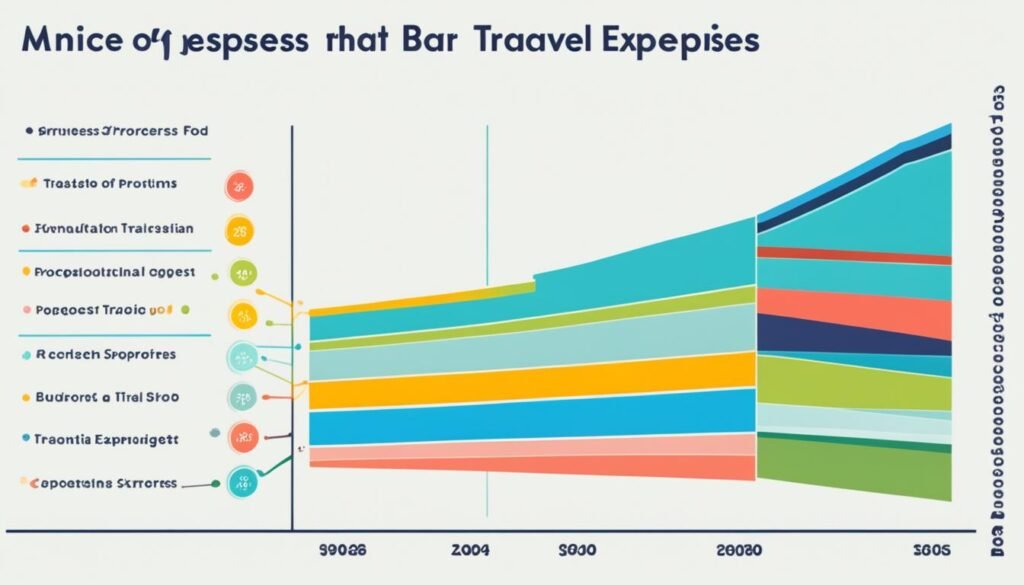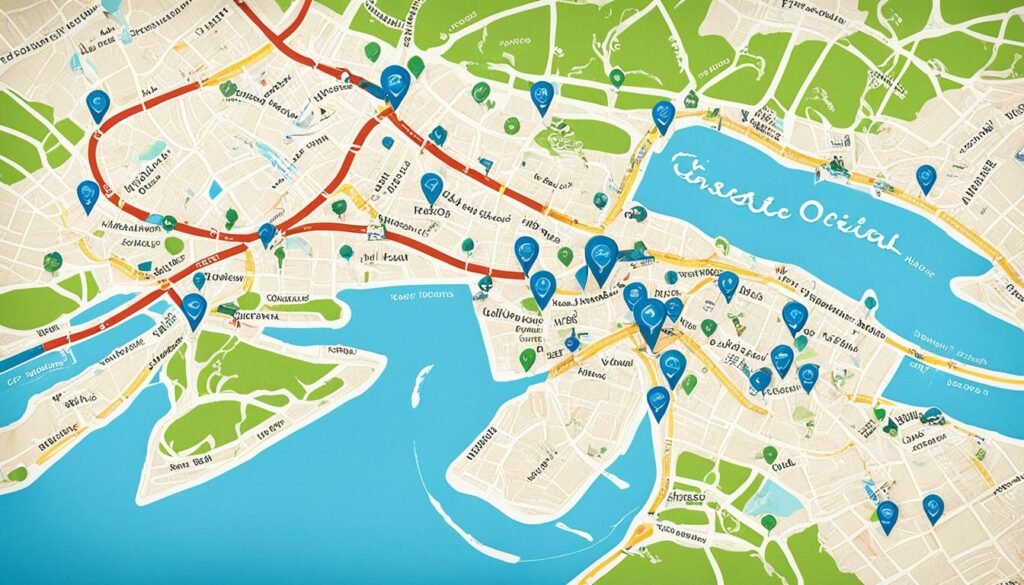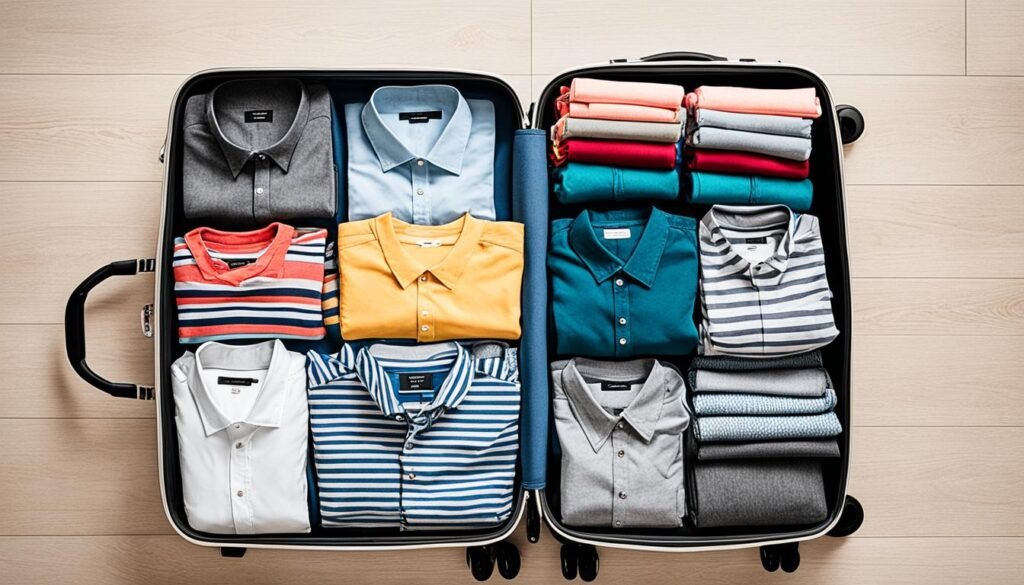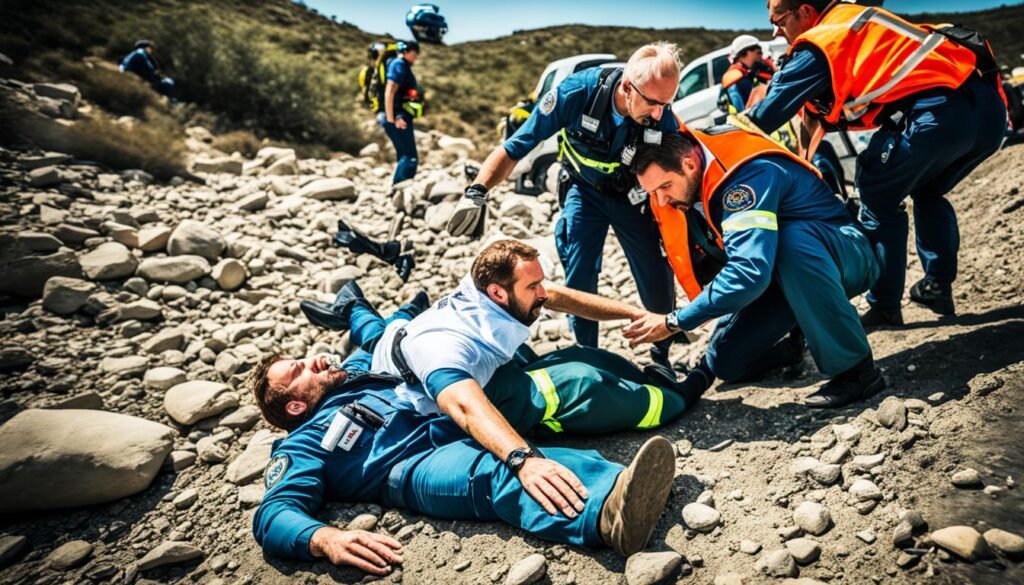Embarking on your first travel adventure can be both exciting and overwhelming. The world is full of wonders waiting to be explored, but where do you begin? How do you navigate the planning process and ensure a smooth and enjoyable trip?
Thank you for reading this post, don't forget to subscribe!Whether you’re a seasoned explorer looking to brush up on your travel skills or a total newbie trying to figure it all out, this comprehensive guide is here to help. From budgeting and documentation to packing and immersing yourself in the local culture, we’ll provide essential tips and advice for beginners. Get ready to navigate your first adventure with confidence!
So, are you ready to uncover the secrets of stress-free travel? Let’s dive in!
Key Takeaways:
- Planning is key to a successful trip
- Research your destination thoroughly
- Set a realistic budget and find cost-saving travel hacks
- Ensure you have all necessary documentation in order
- Choose your first destination wisely
Preparing for Your Journey: The Basics of Travel Planning
Before embarking on any trip, it’s crucial to research your destination thoroughly. This includes understanding the local culture, customs, and etiquette to show respect and blend in with the locals. Knowing and respecting cultural customs can greatly enhance your travel experience and help you avoid any misunderstandings or faux pas.
Start by researching the best time to visit your destination. Weather, holidays, and local events can significantly impact your travel experience, so it’s important to plan accordingly. Make note of any major festivals or public holidays that may affect your itinerary or availability of attractions.
In addition, familiarize yourself with the popular attractions and landmarks at your destination. This will help you create a well-rounded travel itinerary that includes all the must-see sights and experiences. Consider reaching out to fellow travelers or reading travel blogs and reviews to get recommendations and insider tips.
When researching your destination, don’t forget to look into local safety tips as well. While travel is generally safe, it’s always a good idea to be aware of any specific precautions or areas to avoid. Check for any travel advisories or warnings issued by your government and read up on local laws and regulations.
To ensure a smooth trip, it’s essential to take care of essential travel preparations, such as obtaining the necessary travel documentation, including passports and visas, and arranging any required vaccinations. Research the entry requirements for your destination and ensure that your documentation is in order well in advance of your trip.
By investing time in researching and planning, you’ll have a better understanding of what to expect and can create a more fulfilling itinerary. Being well-prepared will allow you to make the most of your travel experience and create lasting memories.
Smart Budgeting: Managing Your Travel Finances
One of the most important aspects of travel planning is managing your travel finances. To ensure a smooth and stress-free trip, it’s essential to analyze costs, set a realistic budget, and discover cost-saving travel hacks. By effectively managing your money while traveling, you can make the most of your experience without breaking the bank.
Analyzing Costs and Setting a Budget
Before embarking on your journey, it’s crucial to analyze the potential travel costs and set a budget that works for you. Consider expenses such as accommodation, transportation, meals, activities, and any additional fees or charges that may arise.
To analyze costs effectively, research the average prices for accommodations, transportation, and attractions at your destination. Utilize online resources, travel forums, and recommendations from fellow travelers to get an accurate picture of what to expect. This information will help you set a realistic budget and allocate your funds accordingly.
When setting a budget, prioritize your expenses based on what matters most to you. Determine your spending limits for each category, and be sure to account for any unexpected expenses that may arise during your trip. By setting a budget, you’ll have a clear understanding of how much you can spend and can make informed decisions about where to save and splurge.
Discovering Cost-Saving Travel Hacks
Traveling on a budget doesn’t mean sacrificing quality or missing out on exciting experiences. By discovering cost-saving travel hacks, you can stretch your budget further and make the most of your trip. Here are a few tips to help you save money while traveling:
- Travel during off-peak seasons or shoulder seasons when prices are lower.
- Consider alternative accommodations such as hostels, guesthouses, or vacation rentals.
- Take advantage of public transportation or walk whenever possible to save on transportation costs.
- Eat like a local and explore affordable street food or local markets.
- Research free attractions, walking tours, or discounted entry days at museums or landmarks.
By implementing these travel hacks, you can reduce your expenses without compromising your experience or missing out on the highlights of your destination.
Handling Money Abroad: Cards and Currency Tips
When traveling abroad, handling money can be a bit tricky. It’s important to familiarize yourself with currency exchange rates and understand how to handle your finances efficiently. Here are some tips to help you navigate money matters during your trip:
- Research foreign currency exchange rates before your trip to get an idea of how much your money is worth in the local currency.
- Consider using a travel money card, which allows you to load multiple currencies onto a single card and withdraw money from ATMs without hefty fees.
- Notify your bank about your travel plans to avoid any issues with using your debit or credit cards abroad.
- Be cautious when using ATMs and avoid using them in less secure locations.
- Keep your money and identification documents secure, preferably using a money belt or a secure wallet.
- Consider having a backup payment method, such as a second credit card or emergency cash, in case of any unforeseen circumstances.
By following these tips, you can ensure your money is accessible, secure, and used efficiently during your travels.

Crucial Documentation: Ensuring a Smooth Trip
Proper documentation is essential for a smooth travel experience. This section will cover important topics such as passport requirements, travel visa information, and travel alerts and advisories. It will also provide guidance on obtaining travel health insurance, getting necessary vaccinations, and carrying emergency contact information. By ensuring you have the right documentation and contacts, you’ll be prepared for any unforeseen circumstances during your trip.
Passports, Visas, and Travel Alerts
When traveling internationally, having a valid passport is a basic requirement. Ensure that your passport is up to date and will remain valid for at least six months beyond your intended departure date.
If you’re planning to visit a country that requires a travel visa, make sure to research and understand the specific visa requirements and application process well in advance of your trip. Different countries have different visa policies and processing times, so it’s important to plan accordingly.
Additionally, stay informed about travel alerts and advisories for your destination. These alerts provide important information on safety and security issues, transportation disruptions, natural disasters, and other relevant updates. Check the website of your country’s foreign affairs office or embassy for the most up-to-date travel alerts.
Health Insurance and Vaccinations
Travel health insurance is crucial to protect yourself against unexpected medical expenses while abroad. Before your trip, research and obtain a comprehensive travel health insurance plan that suits your needs. Make sure to understand what is covered by the insurance and how to access medical services in your destination.
In some cases, certain destinations may require specific vaccinations to enter the country. Consult your healthcare provider or a travel clinic to determine if there are any recommended or mandatory vaccinations for your destination. It’s important to get vaccinated well in advance of your trip to ensure immunity.
Emergency Contacts and Consulate Information
Carrying emergency contact numbers with you is essential in case of unforeseen situations. Make a note of the emergency phone numbers for your destination, including local emergency services and your country’s embassy or consulate. It’s also recommended to store these numbers in your mobile phone for easy access.
In case you need assistance while traveling, consular services are available through your country’s embassy or consulate. They can provide guidance and support in case of lost or stolen passports, medical emergencies, legal issues, or other critical situations. Before your trip, familiarize yourself with the location and contact information of your country’s embassy or consulate in your destination country.
| Emergency Contacts | Consulate Information |
|---|---|
| Local emergency services: 911 | Your country’s embassy/consulate address: 123 Main Street, City, Country |
| Your country’s embassy/consulate phone number: +123 456 789 | Consular services operating hours: Monday-Friday, 9:00 AM – 5:00 PM |
Essential Travel Tips for Beginners: Navigating Your First Adventure
Embarking on your first travel adventure can be an exciting and transformative experience. To ensure a successful trip, there are a few essential travel tips that every beginner should keep in mind. From choosing the right destination to understanding local etiquette and customs, these tips will help you navigate your first adventure with confidence and make the most of your travel experience.
Choosing Your First Destination Wisely
When selecting your first travel destination, it’s important to consider factors such as safety, ease of transportation, and beginner-friendly attractions. Opt for destinations that are known for their hospitality and offer a range of activities suitable for beginners. Popular tourist destinations like Paris, Tokyo, or Rome are often great choices for first-time travelers due to their well-established tourism infrastructure and abundance of attractions.
Learning About Local Etiquette and Customs
Respecting local etiquette and customs is crucial when traveling to a new destination. Take the time to research and understand the cultural norms of your chosen destination, such as appropriate dress codes, greetings, and gestures. Learning a few basic phrases in the local language can also go a long way in showing respect and connecting with the locals.
Creating a Flexible Itinerary
While it’s important to have a general plan for your trip, it’s equally important to be flexible and open to new experiences. Creating a flexible itinerary allows you to embrace unexpected opportunities and adapt to changes in your plans. Leave room for spontaneity and exploration, as some of the most memorable travel experiences often happen when you least expect them.

By following these essential travel tips, you’ll be well-prepared to navigate your first adventure with confidence. Remember to choose your destination wisely, respect local customs and traditions, and create a flexible itinerary that allows for spontaneity. Travelling for the first time can be a life-changing experience, so embrace the unknown and savor every moment of your journey.
Mastering the Art of Packing and Luggage
Packing efficiently and selecting the right luggage are essential skills for any traveler. Follow these tips to ensure a stress-free and organized travel experience.
Selecting the Right Luggage for Your Trip
When choosing luggage, consider the length and nature of your trip. Suitcases are ideal for longer trips and offer more space for clothes and other essentials. Backpacks are better suited for shorter trips or adventures that require more mobility. Consider the pros and cons of each option to determine what best fits your travel needs.
Packing Essentials: What to Bring and What to Leave
To pack efficiently, start by making a packing checklist of essential travel items. This helps you avoid overpacking and ensures you have everything you need. Consider the climate, activities, and duration of your trip when deciding on clothing and accessories. Remember to pack versatile items that can be mixed and matched. Leave behind unnecessary items and consider purchasing toiletries and other essentials at your destination to save space and weight.
Organizing Your Belongings with Packing Aids
To stay organized during travel, use packing aids such as packing cubes and luggage organizers. These help maximize space, prevent clothes from getting wrinkled, and make it easier to find items quickly. Packing cubes are especially useful for separating clothes by category or outfit, while luggage organizers can store toiletries and accessories neatly.

| Packing Tips | Luggage Essentials | Efficient Packing |
|---|---|---|
| Make a packing checklist | Rolling suitcase or backpack | Use packing aids like packing cubes |
| Consider the climate and activities | Carry-on bag and checked baggage | Only pack versatile items |
| Leave behind unnecessary items | Essential travel documents | Pack clothing that can be mixed and matched |
| Travel security locks | Minimize toiletries by purchasing at the destination |
By mastering the art of packing and using the right luggage, you can streamline your travel experience, pack efficiently, and have all your essentials within easy reach.
Strategies for Health and Safety Abroad
In order to have a safe and healthy travel experience, it is essential to prioritize your well-being and take necessary precautions. From staying safe while traveling to ensuring you have the right travel insurance coverage, these strategies will help you navigate potential health and safety challenges abroad.
Prioritizing Health and Safety
When traveling, it is important to prioritize your health and safety to avoid any unforeseen issues. Here are some travel health tips to keep in mind:
- Stay hydrated and drink bottled water to prevent dehydration and reduce the risk of waterborne illnesses.
- Wash your hands frequently with soap and water, or use hand sanitizers to avoid germs and prevent illnesses.
- Pack a basic first aid kit with essential medications, band-aids, and other medical supplies.
- Protect yourself from the sun by using sunscreen, wearing hats, and seeking shade during peak hours.
- Practice safe food hygiene by eating at reputable establishments, avoiding raw or undercooked foods, and washing fruits and vegetables.
- Be mindful of your surroundings and practice personal safety abroad, such as avoiding risky areas and keeping an eye on your belongings.
By following these travel health tips and staying vigilant, you can greatly reduce the risk of encountering health and safety issues during your trip.
Ensuring Travel Insurance Coverage
One of the most important aspects of travel preparation is securing travel insurance coverage. Travel insurance offers various benefits and safeguards against unexpected situations. Here are some travel insurance benefits to consider:
- Medical coverage: Travel insurance can provide coverage for medical emergencies, including hospitalization, doctor visits, and medication costs.
- Trip cancellation/interruption coverage: It offers financial protection if your trip is canceled or cut short due to unexpected events, such as illness, natural disasters, or travel advisories.
- Lost or delayed baggage coverage: Travel insurance can compensate you for the loss, theft, or delayed arrival of your luggage.
- Emergency evacuation coverage: It provides assistance and coverage for emergency medical evacuations if you require specialized medical treatment or need to be transported back to your home country.
- 24/7 emergency assistance: Travel insurance often includes access to a 24/7 helpline for emergency assistance, such as medical advice, travel support, or legal assistance.
When choosing the right travel insurance plan, consider factors such as your destination, travel activities, duration of your trip, and personal requirements. Read the policy details carefully and ensure that it provides adequate coverage based on your needs.
Handling Emergency Situations
While no one wants to imagine themselves in an emergency situation during their travels, it is essential to be prepared and know how to handle such situations. Here are some tips for dealing with emergencies abroad:
- Know the emergency contact numbers for the country you are visiting, including local authorities, embassy/consulate, and your travel insurance provider’s emergency helpline.
- Carry a copy of important documents like your passport, travel insurance policy, emergency contact numbers, and any necessary medical information.
- Familiarize yourself with your destination’s emergency services and medical facilities in advance, so you know how to access help if needed.
- Follow the instructions of local authorities and stay informed about any travel advisories or warnings.
- Contact your travel insurance provider’s emergency assistance helpline in case of medical emergencies, lost documents, or other travel-related emergencies.
Remember to stay calm and seek assistance when needed. Having a plan in place and knowing how to handle emergencies will give you peace of mind and ensure a swift resolution.

| Travel Insurance Benefits | Travel Insurance Coverage | Emergency Preparedness |
|---|---|---|
| Medical coverage | Trip cancellation/interruption coverage | Know emergency contact numbers |
| Lost or delayed baggage coverage | Emergency evacuation coverage | Carry copies of important documents |
| 24/7 emergency assistance | – | Familiarize yourself with local services |
By prioritizing your health and safety, ensuring travel insurance coverage, and knowing how to handle emergencies, you can have a safer and more enjoyable travel experience. Remember to plan ahead, stay informed, and take necessary precautions to make the most of your adventure.
Immersive Travel: Making the Most of Your Destination
Immersing yourself in the local culture and experiencing authenticity are key elements of a fulfilling travel adventure. By understanding and respecting cultural differences, engaging with locals, and trying local cuisine, you can truly connect with the community and create lasting memories.
Understanding and Respecting Cultural Differences
When traveling, it’s important to familiarize yourself with the local customs, traditions, and etiquette. Show cultural sensitivity by researching the destination’s cultural norms and respecting the local customs. This includes dressing appropriately, learning a few key phrases in the local language, and adhering to local customs regarding greetings and gestures. By respecting the local culture, you’ll be able to navigate the destination with ease and gain a deeper appreciation for the local way of life.
Engaging with Locals and Experiencing Authenticity
Interacting with locals is a fantastic way to immerse yourself in the local culture. Strike up conversations, ask for recommendations, and participate in local activities. Be open to making connections and forging friendships with the locals. They can offer unique insights, share stories, and introduce you to hidden gems that aren’t found in guidebooks. By engaging with locals, you’ll gain a deeper understanding of the destination and create meaningful connections.
Eating Local: Tips for Food Safety and Enjoyment
Trying local dishes is an essential part of cultural immersion. To ensure food safety while traveling, follow these tips:
- Choose restaurants and food vendors that have a high turnover of customers, as it indicates fresh ingredients.
- Eat food that is cooked thoroughly and served hot.
- Wash your hands before eating and use hand sanitizers if necessary.
- Drink bottled water and avoid ice cubes or unfiltered tap water.
- Be cautious of street food stalls, ensuring they follow proper hygiene practices.
By trying local dishes, you’ll not only indulge in delicious flavors but also gain insights into the local culinary traditions. Food is a powerful medium to connect with the community and appreciate the flavors of a destination.
By embracing cultural immersion, respecting local customs, engaging with locals, and trying local delicacies, you’ll create lasting memories and a deeper connection with your destination.
Staying Connected: Tech Tips for Travelers
In an increasingly connected world, staying connected while traveling is essential. Whether you want to keep in touch with loved ones, access important information, or navigate unfamiliar territories, technology can be your best travel companion. This section provides valuable tips on communication and connectivity, as well as suggestions for essential travel gadgets and apps to enhance your travel experience.
Communication and Connectivity
When traveling internationally, there are several options to ensure you stay connected. One popular method is using international SIM cards. These cards allow you to use your own phone while abroad, avoiding expensive roaming charges and ensuring you have a local number for making calls and accessing data.
Another option is to take advantage of Wi-Fi access. Many hotels, cafes, and airports provide free or paid Wi-Fi, allowing you to connect to the internet without using your phone’s data. Additionally, you can consider investing in portable Wi-Fi devices that provide a secure and reliable internet connection wherever you go.
Staying connected with loved ones is important, and there are several ways to do so while traveling. Messaging apps such as WhatsApp, Viber, and Telegram allow you to send text messages, make voice and video calls, and share multimedia with friends and family back home. Additionally, social media platforms like Facebook, Instagram, and Twitter enable you to share your travel experiences in real-time.
Travel Apps and Online Resources
Travel planning apps can significantly simplify your trip preparation. Apps like TripIt, Google Trips, and Tripadvisor help you organize your itineraries, find the best flights and accommodations, and discover popular attractions and activities. With these apps, you can have all your travel information easily accessible in one place.
Navigation apps are also essential for exploring new destinations. Google Maps, Apple Maps, and Waze provide accurate directions, real-time traffic updates, and public transportation information, ensuring you can navigate your way around unfamiliar cities with ease.
Language translation apps can help overcome language barriers and facilitate communication. Apps like Google Translate, iTranslate, and Microsoft Translator allow you to translate text or speech in real-time, making it easier to interact with locals and understand menus, signs, and transportation information.
Cybersecurity and Privacy
While technology enhances our travel experiences, it’s important to prioritize cybersecurity and protect your personal information. When using public Wi-Fi networks, consider using a Virtual Private Network (VPN) to encrypt your data and maintain privacy. VPNs create a secure connection between your device and the internet, shielding your information from potential hackers.
Furthermore, be cautious when connecting to unfamiliar Wi-Fi networks and avoid accessing sensitive information, such as online banking accounts or personal emails, on public networks. Regularly update your devices’ operating systems and applications to ensure they have the latest security patches.
Remember to use strong, unique passwords for your accounts and enable two-factor authentication whenever possible. Additionally, consider using a password manager to securely store your passwords and avoid using public computers or charging stations to minimize the risk of data theft.
Staying connected while traveling opens up a world of possibilities and convenience. By utilizing travel tech, essential gadgets, and following good cybersecurity practices, you can make the most of your trip and stay connected to the world around you.
Conclusion
Congratulations! You’ve reached the end of this comprehensive guide to essential travel tips for beginners. By following these tips and advice, you’ll be well-prepared to navigate your first travel adventure with confidence and create unforgettable memories. Remember to embrace new experiences, immerse yourself in the local culture, and stay open to the unexpected. Bon voyage!





